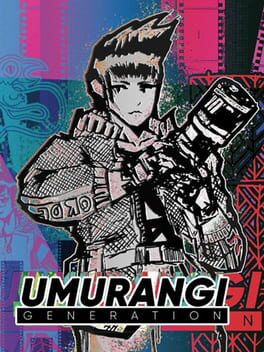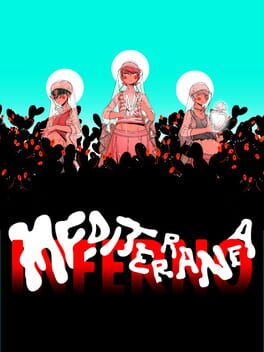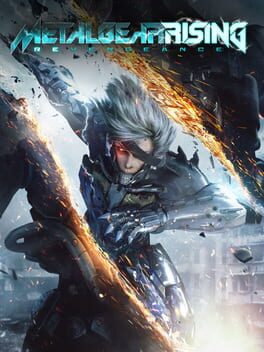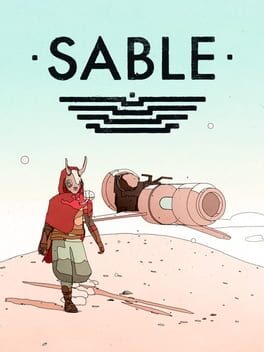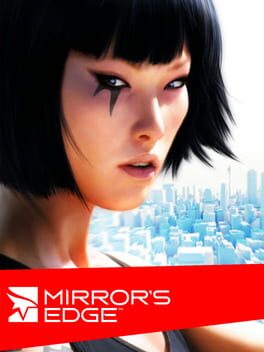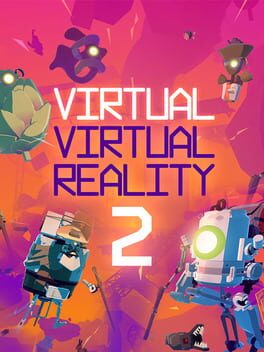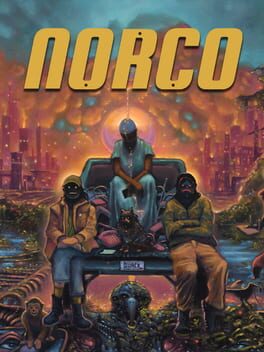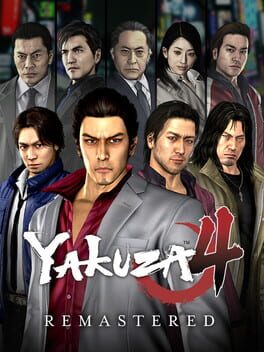2019
2020
2023
Beautiful, angry, raw. This game explores the struggles of queer youth during the pandemic in Italy through an outwardly flamboyant and hedonistic tone both in its aesthetics and narrative, revealing some real anger and frustration boiling underneath the surface. It might not have the most polished writing and themes, but it is worth playing just to experience a confident narrative from a point of view that is fresh and deeply personal.
This is a deeply flawed game that doesn't have the game design finesse to truly stick the landing on many of its ambitious goals. It is endlessly repetitive, clunky in its progression and inventory systems and uninspired in its quest design. This version doesn't fix these issues, although the more polished combat certainly helps.
At the end, after Ending E, I have to look back, though, and realize that these 'flaws' and repetition add unique qualities to the experience that are difficult to truly put into words. It is a vibe. It is the familiarity of knowing every corner of every area. Knowing every story beat that follows and mowing through boss fights comfortably. You are forced to linger in these spaces sometimes longer than is comfortable, burning them into your memory. Entering Facade for the first time in Replicant flooded me with nostalgia and comfort for the experience I had with the original.
Time will smooth the rough edges and leave a truly remarkable gaming experience in my memory that shines brightly through its fantastic characters and legendary score.
At the end, after Ending E, I have to look back, though, and realize that these 'flaws' and repetition add unique qualities to the experience that are difficult to truly put into words. It is a vibe. It is the familiarity of knowing every corner of every area. Knowing every story beat that follows and mowing through boss fights comfortably. You are forced to linger in these spaces sometimes longer than is comfortable, burning them into your memory. Entering Facade for the first time in Replicant flooded me with nostalgia and comfort for the experience I had with the original.
Time will smooth the rough edges and leave a truly remarkable gaming experience in my memory that shines brightly through its fantastic characters and legendary score.
Still just as exhilarating as it was when I first played it as a teenager on release. With this replay I could finally remedy a big regret of my gaming career: Actually beating the final boss and finishing the game on hard difficulty, which I just couldn't do in 2013, as the difficulty spike was just too brutal.
In the years after its release Rising became a cult classic and with good reason - the game is not only a phenomenal action game with some of the best uses of music in combat but is also infinitely quotable through the narrative in between that doesn't overstay its welcome.
There are definitely some rough edges where the game pulls you away from what the fun part is by introducing various stealth sections to somehow prove that it is a Metal Gear game, I guess. And the weapons and items you get are really not that interesting at the best and annoyingly clunky and useless at the worst, providing some unnecessary fat in an otherwise remarkably lean experience. At the end I don't feel like faulting the game for anything, though. It is so full of character and charm, that it just gets away with it, cementing itself as one of my favorite games of all time.
In the years after its release Rising became a cult classic and with good reason - the game is not only a phenomenal action game with some of the best uses of music in combat but is also infinitely quotable through the narrative in between that doesn't overstay its welcome.
There are definitely some rough edges where the game pulls you away from what the fun part is by introducing various stealth sections to somehow prove that it is a Metal Gear game, I guess. And the weapons and items you get are really not that interesting at the best and annoyingly clunky and useless at the worst, providing some unnecessary fat in an otherwise remarkably lean experience. At the end I don't feel like faulting the game for anything, though. It is so full of character and charm, that it just gets away with it, cementing itself as one of my favorite games of all time.
2021
What a banger. This feels like a blockbuster Metroid game, which sounds weird considering its traditional 2D nature. The perspective is the only thing traditional about this game, though. The controls are buttery smooth, the use of 3D in cinematics and general gameplay adds massive value in cinematography and visual flourishes. This feels like a truly modern Metroid game that finds its place neatly in a genre that has grown many entries surpassing its origins. The cinematic focus and streamlined gameplay suffer one minor casualty, though. The exploration. Metroid Dread is a weirdly linear game that wants you to believe that it is totally open. Once you gain new abilities you obviously want to explore previous areas to make use of them, which almost never works out due to newly placed artificial boundaries like temperature changes, random physical blockades or totally sectioned off areas only accessible from one direction. I was waiting for a fast travel system or something similar to have this issue remedied after finally having some major upgrades, but it never came just like the drive to explore old areas quickly died off because the game clearly wanted to funnel me into a linear experience that still takes you back and forth across all areas, just not on your own terms, which stings a bit. The game makes up for it, though, if you let it and embrace the kind of game it is, which is why I still hold this game in the highest regards. It isn't the best metroidvania, but it might be the best (at least 2D) Metroid.
2021
Tales of Arise is a complete JRPG package polished from start to finish unlike many others. The battle system is carried by incredibly varied and fluid animations and playstyles while being hindered by finicky menu management of loadouts of your AI companions, the story is interesting throughout even if it played it a bit too safe in the end and the characters are lovable and have great dynamics... Okay this out of the way, I wanted to talk about something weirdly specific that stood out to me about this game:
The economy of ressources and rewards is amazing. On Normal difficulty I always felt like I was just scraping by in terms of money, right until the point where I was mentally getting ready to wrap up, at which point the tight grip loosened, which was remarkable to me and felt perfectly balanced.
Another aspect of that are the skill points. So you unlock a lot of small skill trees by doing side quests, achieving certain milestones with a character or progressing the main story, but by default regular fights really don't give you that many points to invest. This is where side quests come in, which almost always have a hefty skill point reward in addition to other rewards, which made them absolutely addictive to me, since you could essentially choose your reward and the balance being such that it always felt great to be able to finally afford a new attack or stat bonus or complete a skill tree for the completion bonus. Even when mostly clearing out all the side quests in the game available in the first playthrough I still didn't finish all the skill trees but ended up at a point where I was satisfied with my characters. All that with barely any grinding required. That is honestly an incredible feat and something to be studied for its game design balance and a hook that drew me deeper into the systems of Arise. And this is not even mentioning other rewards like recipes or cosmetics, which I also really enjoyed.
Tales of Arise was my first Tales game as you could probably tell if any of the systems I described are series staples refined over decades, but this game certainly made a great impression and while other entries in the franchise never looked appealing to me, I am definitely keeping an eye out on the future of the series.
The economy of ressources and rewards is amazing. On Normal difficulty I always felt like I was just scraping by in terms of money, right until the point where I was mentally getting ready to wrap up, at which point the tight grip loosened, which was remarkable to me and felt perfectly balanced.
Another aspect of that are the skill points. So you unlock a lot of small skill trees by doing side quests, achieving certain milestones with a character or progressing the main story, but by default regular fights really don't give you that many points to invest. This is where side quests come in, which almost always have a hefty skill point reward in addition to other rewards, which made them absolutely addictive to me, since you could essentially choose your reward and the balance being such that it always felt great to be able to finally afford a new attack or stat bonus or complete a skill tree for the completion bonus. Even when mostly clearing out all the side quests in the game available in the first playthrough I still didn't finish all the skill trees but ended up at a point where I was satisfied with my characters. All that with barely any grinding required. That is honestly an incredible feat and something to be studied for its game design balance and a hook that drew me deeper into the systems of Arise. And this is not even mentioning other rewards like recipes or cosmetics, which I also really enjoyed.
Tales of Arise was my first Tales game as you could probably tell if any of the systems I described are series staples refined over decades, but this game certainly made a great impression and while other entries in the franchise never looked appealing to me, I am definitely keeping an eye out on the future of the series.
2021
The atmosphere, soundtrack, artstyle and world building are all absolutely superb and the combination of gliding and climbing with the BOTW stamina system creates a surprisingly fun loop of just figuring out how to reach certain areas. So why did I stop playing this?
Well, as fun as the climbing is, too often I encountered collision issues where invisible walls would appear in thin air while clearly defined geometry had wrong collision making it not passable. This unfortunately is a pretty big deal in a game build on the promise of allowing you to go anywhere, breaking valuable trust in that regard. The other, almost even bigger issue is the hoverbike. It is super fun to ride around and customize your bike and with a dedicated whistle button you would expect to be able to call your bike to any location you need it in, even if it means that it will teleport in off-screen or something. This is not the case. The whistle basically doesn't work at all unless you essentially already see your bike and even then it is hit or miss due to technical issues. This really broke the experience for me at this point, creating a need to use fast travel to reset the bike, defeating the purpose of soaking in the atmosphere on the rides to different locations.
These are all technical issues, though. I like the underlying game very much. I really hope these issues can be ironed out in the future but until then I wouldn't really recommend the game unless you can put up with these issues.
Well, as fun as the climbing is, too often I encountered collision issues where invisible walls would appear in thin air while clearly defined geometry had wrong collision making it not passable. This unfortunately is a pretty big deal in a game build on the promise of allowing you to go anywhere, breaking valuable trust in that regard. The other, almost even bigger issue is the hoverbike. It is super fun to ride around and customize your bike and with a dedicated whistle button you would expect to be able to call your bike to any location you need it in, even if it means that it will teleport in off-screen or something. This is not the case. The whistle basically doesn't work at all unless you essentially already see your bike and even then it is hit or miss due to technical issues. This really broke the experience for me at this point, creating a need to use fast travel to reset the bike, defeating the purpose of soaking in the atmosphere on the rides to different locations.
These are all technical issues, though. I like the underlying game very much. I really hope these issues can be ironed out in the future but until then I wouldn't really recommend the game unless you can put up with these issues.
2008
This was one of my favorite games growing up and upon replaying it, I noticed that it probably played a big part in inspiring me to pursue game development. However, I also came to realize that it didn't age all that well for me apart from the art style, which is still absolutely impeccable. The biggest issue is the combat/the enemies, absolutely draining the flow and feeling completely antithetical to the world building, core gameplay and aesthetic.
The first person freerunning gameplay was absolutely revolutionary at the time but now, 13 years later as many games have taken the template to new directions, feels clunky and way slower than I remembered.
I will still always cherish this game for the nostalgia, vibes and aesthetic, though.
The first person freerunning gameplay was absolutely revolutionary at the time but now, 13 years later as many games have taken the template to new directions, feels clunky and way slower than I remembered.
I will still always cherish this game for the nostalgia, vibes and aesthetic, though.
This was borderline unplayable for me at the time of writing. Tender Claws has banked maximum good will with the first one and especially The Under Presents, so I will wait out some patches and return to it when it is hopefully more stable in terms of glitches and bugs, because what little I played of it definitely had potential.
2022
Norco absolutely rules. One of the best written games I have ever played, feauturing a gorgeously realized and mesmerizing setting so confident in every step that you can't help but be sucked into the fever dream it is presenting. I stopped playing the demo after 10 minutes because I knew immediately that this would be amazing and I am glad I was right. Feels right at home next to a Kentucky Route Zero and Disco Elysium, which completes an interesting trifecta of games to recommend if you have played any one of these.
2019
This is a big leap from Yakuza 3 and for the series as a whole, expanding the cast to four playable characters. It mostly works incredibly well, the characters play and feel distinct and the plot takes away the focus from at this point repetitive clan infighting or foreign threats and instead shines light on different, fresh new players in Kamurocho. It ties back to older entries in the series ambitiously but unfortunately drops the ball hard with incredibly stupid twists and fake outs resulting in a mess of betrayals and feuds that I couldn't care to keep up with in the end. Still, this game has some of my favorite music and combat in the series so far and feels so much better to play than Yakuza 3.

